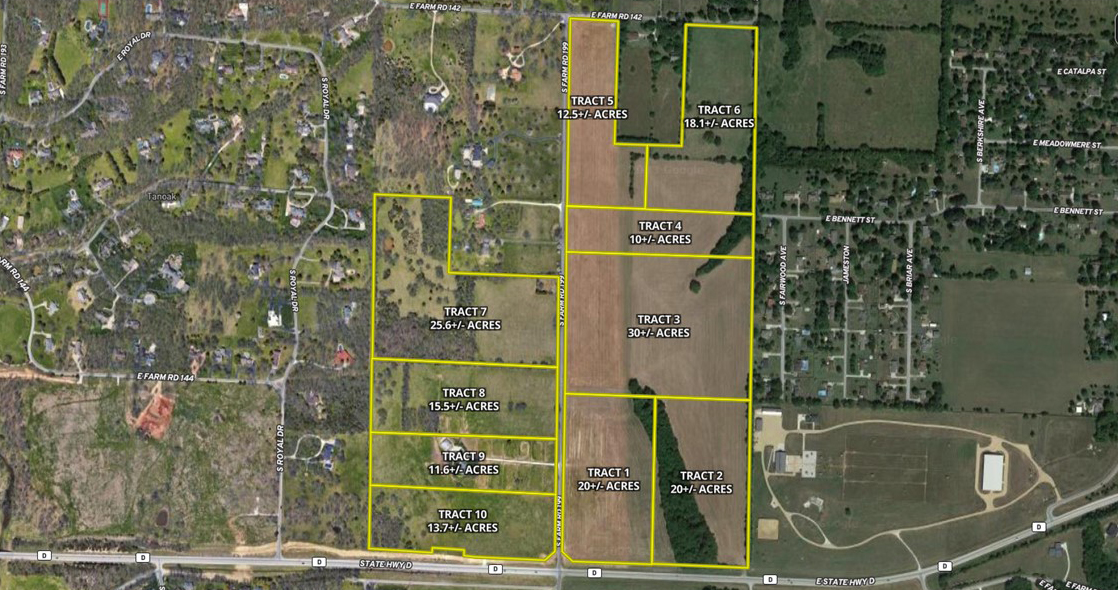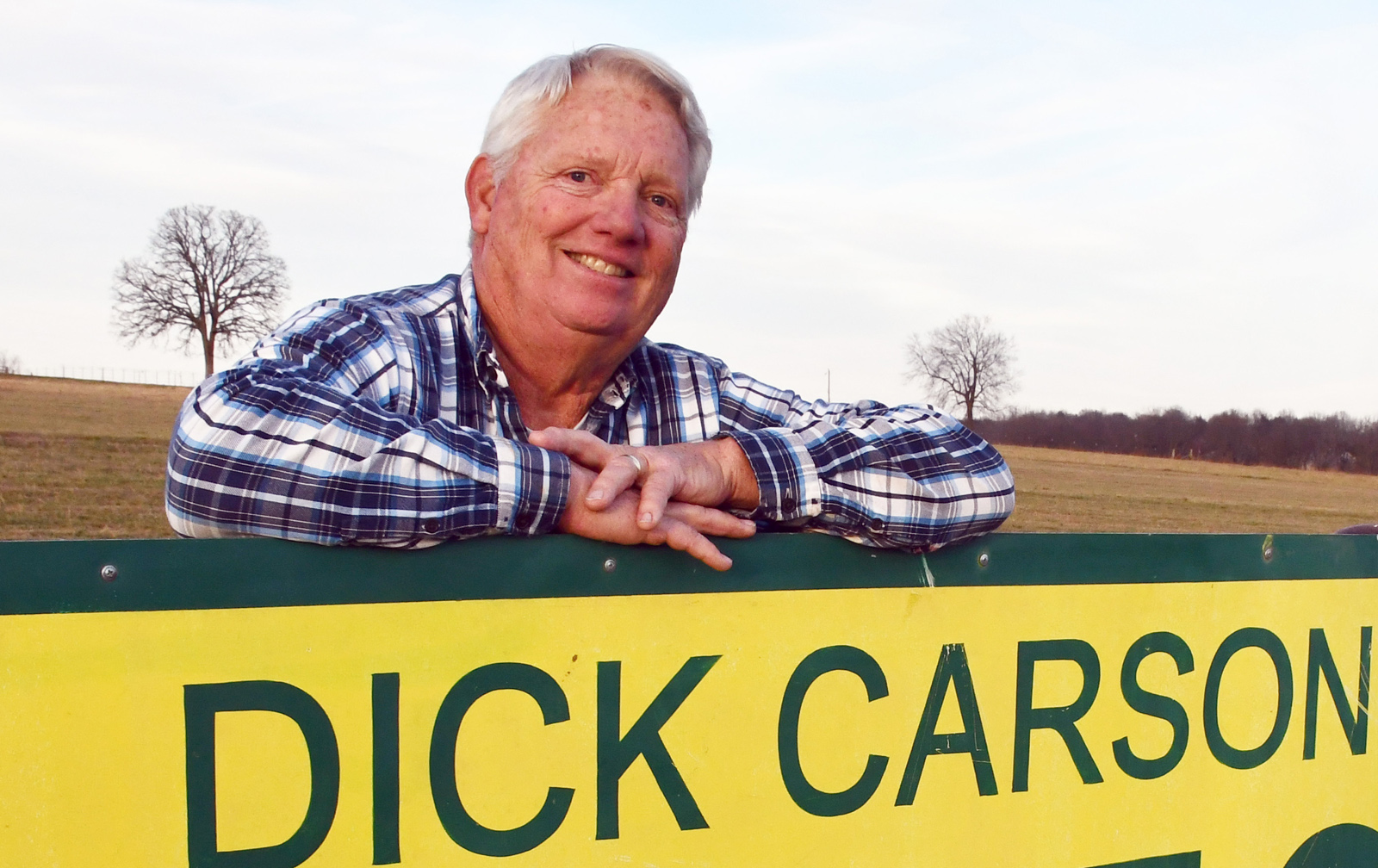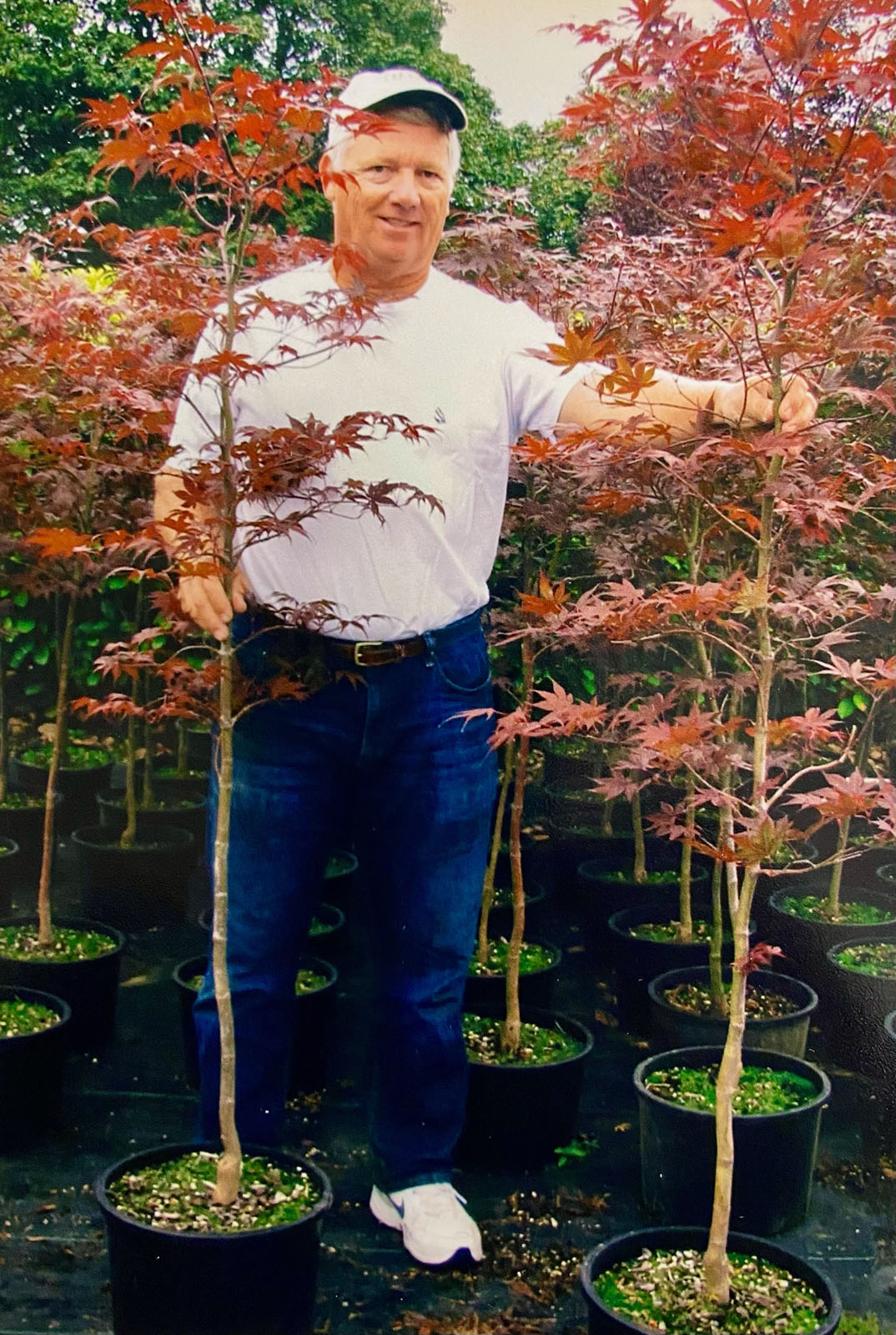Editor's note: This story has been updated to reflect evolving plans for the new nursery.
One of the most familiar names in Springfield nursery businesses has purchased an unlikely acreage just east of the city with the avowed purpose of establishing a new retail outlet.
The name is Dick Carson. The green and yellow Carson’s Nurseries logo that he invented has been prominent hereabouts for almost a half-century.
However, Dick Carson hasn’t been associated with Carson’s Nurseries since the early 2000s. More about that later.
The somewhat surprising location for his latest venture is a couple miles east of Sam’s Club on East Sunshine Street (Highway D) at the intersection with Farm Road 199. It amounts to about 14 acres and includes a quarter-mile of frontage on the north side of Sunshine Street.

The unexpected aspect of this site is that it was among 10 tracts totaling almost 175 acres that were auctioned in early September, yielding more than $5.5 million. Given the well-known local developers and investors participating in the auction, the natural assumption was — and is — that the property’s destiny is upscale residential.
However, Carson has added a twist with plans for his parcel.
“I did my homework,” he says. He researched county records and discovered that while the vast majority of the land is presently zoned for agricultural use, the two acres on the northwest corner of Sunshine and FR199 are zoned C-2 commercial, which allows retail and service businesses.
“It got zoned that way because a veterinarian back in who-knows-when decided that he wanted to put his office there — but he never did,” Carson explains.
Carson has installed a large yellow banner proclaiming that his 14 acres soon will sprout “Dick Carson’s ‘Carson Collection.’”
Site to feature dogwood and maple trees
His plan is to devote most of the acreage to an attractive growing area — primarily trees, especially maple and dogwood — designed to catch the eyes of occupants of the 40,000 vehicles said to pass by daily on Sunshine.
It could be that as the predicted residential neighborhood blossoms, other uses for the prominent portion of prime real estate might arise. But for now, Carson is moving determinedly toward establishing his new nursery.
However, don’t confuse it with the existing Carson’s Nurseries operation that he founded in the 1980s and remains highly visible in the James River valley between Springfield and Nixa on the Greene-Christian county line. Nor with any other former Carson’s Nurseries sites, including where an Arvest Bank now stands in the 3100 block of East Sunshine Street, or on the southwest corner of Campbell Avenue and Sunset Street that became a Bass Pro boat delivery lot.
Carson sold Carson’s Nurseries in 2007 so he could devote more time to his first wife, Mary Kay, who had been diagnosed with cancer. She died in January 2010.
“I had a guy who wanted to buy the business, and I sold it for a song,” he recalls. “It was just, you know, to get out and be free to spend more time with her. I gave him everything — the name, the logo, everything. I was all about getting the deal done.”
The deal also was supposed to allow Carson to continue to work at the business as long as he wished to do so. But the arrangement was terminated after about a year.
Name, and reputation, are valuable assets
Carson retained two valuable assets — his personal name recognition and his professional reputation as a knowledgeable nurseryman and landscape designer.
He’d started as a youngster, in the yard of his grandfather, prominent developer and builder W. W. Johnson, in the Phelps Grove Park neighborhood.
“His yard was completely landscaped; he had flowers everywhere. When I was 5 or 6, I started going there and pulling weeds or whatever he told me to do. That started my love of taking care of flowers. And his office was right there, so I’d get a timecard and fill it out and give it to his secretary.”
As a teen he learned more working for the construction company operated by his father, John M. Carson, and also for the state highway department.
He thought of becoming an attorney, but wound up pursuing a comprehensive degree in public administration and urban and regional planning from what was then Southwest Missouri State University. He augmented support provided by his parents by earning extra money hiring himself out to perform lawn maintenance, tree-trimming and planting shrubs.
Following his graduation from SMS in 1975, a great-aunt loaned Carson $2,000 to start his first commercial operation. It initially was branded Sunshine Nurseries, and was on East Sunshine where the BMW of Springfield automobile dealership now is located.
“One of my neighbors painted a nice sign for me, and we went out and hung it up one morning about 9 o’clock, expecting cars to just start pulling in,” he recounts with a chuckle. “But it didn’t quite work like that.”

The youngest of eight siblings, Carson dodged attempts by his dad, who was skeptical of the fledgling nursery business, to lure him into taking over the construction company. “He’d tried that with my four brothers,” Carson says, still smiling, “and they and my sisters all warned me — ‘Don’t do it, don’t do it!' — because he wouldn’t really have retired.”
Carson continued to keep the nursery going for about a year – “I didn’t make any money, really, just enough to pay the salaries of the people working there for me” – but he also signed on with the City of Springfield as a planner, working on the renovation of Silver Springs Park and other urban renewal projects over the next six years.
Then he gave the nursery business another try. This time it took root.
An early boost came when he won the contract to do the landscaping and maintenance at the then-new Cooper Estates gated residential complex. And he learned how to keep a nursery profitable year-round:
“In the spring you can’t have enough people to do all the calls. Then in the summer it turns 90 degrees outside and the phones quit ringing. There still are trees and shrubs to trim, but it slows down even more when the leaves fall off the trees. We sold mums and pumpkins, and that would get us to December when we sold Christmas trees. Then it’s pretty much nothing until March except getting ready for spring again.”
After he was shut out from Carson’s Nurseries, he reverted to doing small-scale landscaping, occasionally establishing short-term sales lots around town. And he met Martha Broyles, who also had suffered the loss of a spouse to cancer. They married in 2012.
Oregon farm supplies trees for Ozarks
A key to success for his past nursery operations, and an essential strategy for his new “Carson Collection” plan, is rooted almost 2,000 miles from the Ozarks, in the state of Oregon.
“I would get plants in from all across the nation, but I noticed that the plants from Oregon looked the best. So from the early ’80s, every year I’d go out there. I made good friends there. Eventually I bought a farm there.”
It was a tree farm, with Japanese maples and dogwoods the main crops.

“They’re grafted,” he says. “What you do is you take the green Japanese maple, which grows from seed, and you put them in a seed bed or in trays and put them out in the field. Then you graft a cutting, a bud, from a different type of Japanese maple. The Bloodgood maple is our best seller.
“The green Japanese maple — I wouldn’t call it a weed, but it’s a very vigorous grower with a big root system. There’s something like 400 other varieties of Japanese maples, and they’re slightly weaker. But they’re stronger when combined with the good root system of the green maple.”
Similar techniques are employed with dogwoods, grafting buds from flowering varieties onto seedlings of the hardy Japanese Kousa dogwood.
“We’re going to do that here,” Carson says when the new “Carson Collection” operation gets up and running, hopefully by next spring and summer.
“What we’re going to start out with is a greenhouse that we’re going to put in a corner of the two-acre lot,” he says. “I’m going to ship in some big evergreens, big blue spruce, to attract attention. We’ll have row upon row of trees. And you’ll start to see some things show up that, for the most part, nobody else has for sale around here.”
Carson also foresees attractive pricing. “It’s going to be grower-direct,” he says, with no middleman between his operation and retail customers.
Trees, shrubs and flowers such as dahlias will be contained in pots, not rooted in the ground, which will ease transfer and transplanting to customers’ properties. He also will use “grow bags” which promote development of healthy root systems.
One of the first tasks will be to install nine-foot-tall mesh fencing to keep deer from munching the crops. And, like most businesses these days, finding good employees will be a challenge.
He has hired an employee who has a business degree and also a horticulture degree. He is on the lookout for another experienced landscaper.
“I have to hire people to do the heavy work,” says Carson, who turns 73 on Dec. 30. “A year ago the doctor told me, ‘Your days as a laborer are over.’ But I still run the equipment, and I still like to do trimming and things that are not real heavy work.
People ask me ‘When are you going to just retire?’
Dick carson
“People ask me ‘When are you going to just retire?’ But the way I look at it is ‘Well, we have inventory in Oregon, and there are other people out there that I can buy more unusual inventory from. And, of course, we will grow things here.’
“So we’re going to put (the Carson Collection) out on Sunshine. It’s going to be more like a hobby nursery. I don’t know that we’re going to have regular hours — if we’re not there, we’re not there, but people will be able to call or email us.
“We want to make people happy with good products. But we want to have fun, too.”


